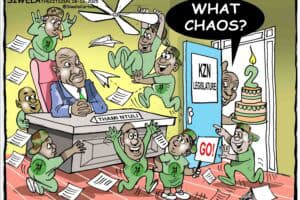The president's lawyers want to make fresh representations to NPA head Advocate Shaun Abrahams.

President Jacob Zuma’s legal team and the National Prosecuting Authority (NPA) on Thursday conceded the decision to drop more than 783 charges of fraud, corruption, racketeering and money laundering eight year ago against Zuma was irrational.
Advocate Kemp J Kemp, for Zuma, made the concession in the Supreme Court of Appeal (SCA) in Bloemfontein. He said, however, his client wanted the opportunity to make fresh representations to the National Director of Public Prosecutions (NDPP), Advocate Shaun Abrahams.
Zuma and the NPA were appealing the North Gauteng High Court’s April 2016 ruling that the charges for alleged corruption over the 1999 multi-billion rand Arms Deal should be reinstated.
The SCA was supposed to hear oral arguments for leave to appeal from the legal teams – including the Democratic Alliance (DA) which has been fighting for the charges to be reinstated for almost a decade – for two days. However, judgement in the matters has been reserved.
What are the spy types all about?
At the centre of the current legal dispute is the timing of the decision by the then acting National Director of Public Prosecutions, Advocate Mokotedi Mpshe, to institute fresh charges against Zuma in 2007.
At the time, Zuma was involved in a leadership struggle with then president Thabo Mbeki, which was due to come to a head at the ANC’s national conference in Polokwane in December that year. In the end, Mpshe decided – presumably to avoid any appearance of political entanglement – to postpone the serving of an indictment until after the Polokwane conference.
Following his indictment, Zuma and his legal team claimed the prosecution was influenced by political motives. To this end, they provided as evidence, copies of intercepted telephone conversations (the so-called “spy tapes”) involving the head of the NPA’s Directorate for Special Operations, Leonard McCarthy. Of specific importance was McCarthy’s conversations with Mpshe’s predecessor, Bulelani Ngcuka, who was widely seen as a Mbeki supporter.
This culminated in Mpshe announcing in 2009 that Zuma’s prosecution would be discontinued. The reasons he offered for his decision were based on “policy aspects”, arising from allegations that the intercepted telephone conversations indicated that McCarthy had manipulated the timing of the serving of the indictment at the behest of allies of Mbeki in the run-up to, and fall-out after the Polokwane conference.
The DA approached the courts to review Mpshe’s decision, asking for it to be set aside on the basis of irrationality. Advocate Sean Rosenberg represented the party.
This was how President Zuma's advocate Kemp conceded decision to stop his prosecution wasn't rational: #ZumaSCA pic.twitter.com/wmGGWwewPq
— Karyn Maughan (@karynmaughan) September 14, 2017
– Additional reporting African News Agency (ANA)
ALSO READ:
//






